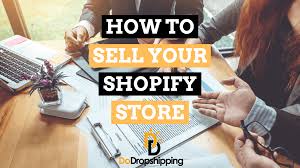
Selling a Shopify store is a multi-step process that requires preparation, understanding of the market and knowledge of the platforms where you can list your store.
Here’s a comprehensive guide on how to sell your Shopify store using some key strategies.
Some Main following Keywords also discuss here
- Should I sell my Shopify business?
- When is the best time to sell?
- Where to sell my Shopify store?

Selling my shopify store with complete guideline
1. Getting your Shopify store ready for sale
Before listing your Shopify store for sale, make sure it’s well-prepared to attract potential buyers.
Steps:
Improve Store Performance:
Make sure your website is optimized throughout. Check page loading speed, mobile responsiveness, and overall user experience. Update any old plugins or themes.
Financial records:
Organize your profit and loss statements, balance sheets, and other financial documents for at least the last 6-12 months.
Verify traffic and sales analytics:
Use tools like Google Analytics and Shopify’s Local Analytics to show consistent traffic and revenue. Buyers will want to see continued growth and performance.
Inventory Management:
Make sure you have a clear record of your inventory levels, suppliers, and any outstanding orders. If the store is drop shipping, be transparent about your suppliers.
Legality:
Make sure your business is legally valid (trademarks, patents, etc.). If you have contracts with vendors or suppliers, be prepared to move them.

2. Valuing Your Shopify Store
Understanding how much your store is worth is crucial to determining the right price.
Ways to value your store:
Multiple revenue streams: Generally, e-commerce businesses sell for 2-4 times their annual profit. For example, if your store’s profit is $100,000/year, you can sell it for $200,000 – $400,000.
Traffic and conversion rates:
High traffic websites with high conversion rates attract better offers.
Customer base:
The number of repeat customers, email lists, and social media followers can affect value.
Potential growth:
Stores in modern locations or with untapped growth potential can sell at a premium.
3. Platform to sell your Shopify store
There are several platforms where you can list your Shopify store for sale:
Popular Platforms:
Shopify Exchange Marketplace: This is Shopify’s own marketplace where you can list your store. It is specifically designed for Shopify stores to buy and sell, making it one of the most trusted platforms
Flippa:
A leading marketplace for selling websites, including Shopify stores. You can find smaller, newer stores and more established stores here.
Empire Flippers:
specializes in selling established and profitable online businesses. It is known to be a premium marketplace with a detailed vetting process.
FE International:
A well-established broker for e-commerce businesses, offering valuation and full-service sales.
Private Selling:
You can also choose to sell your store privately by reaching out to business contacts or posting in business forums. This method can sometimes avoid heavy commissions from brokers or platforms.

Should I sell my Shopify business?
Deciding to sell your Shopify business depends on several factors. If you feel like you’re winding down or ready to take on new opportunities, and your business is profitable with steady growth, it may be a good time to sell. Selling your store when it’s at its best can maximize its value. However, if there are untapped growth opportunities or if the market is still expanding, holding out can lead to more profits. It is important to evaluate your personal goals, financial needs and market outlook before making a decision.

When is the best time to sell?
The best time to sell your Shopify business is when it is performing well and has strong financials, such as consistent revenue growth, stable profits, and solid customer engagement.
Key pointers for optimal timing are:
Best Performance:
Your store is generating strong, steady profits and has a healthy growth trajectory.
Favorable market conditions:
Your niche is in demand, and the e-commerce market is thriving, making your store attractive to buyers.
Clear growth potential:
Buyers see opportunities for further expansion, which makes the business more valuable.
Personal readiness:
You are ready for change or need capital for new ventures, and you are emotionally ready to sell.
Before a big decline:
Sell before the market becomes saturated or the trends in your position begin to decline.
Selling when all or most of these factors are aligned can help you maximize your sales value and results.




